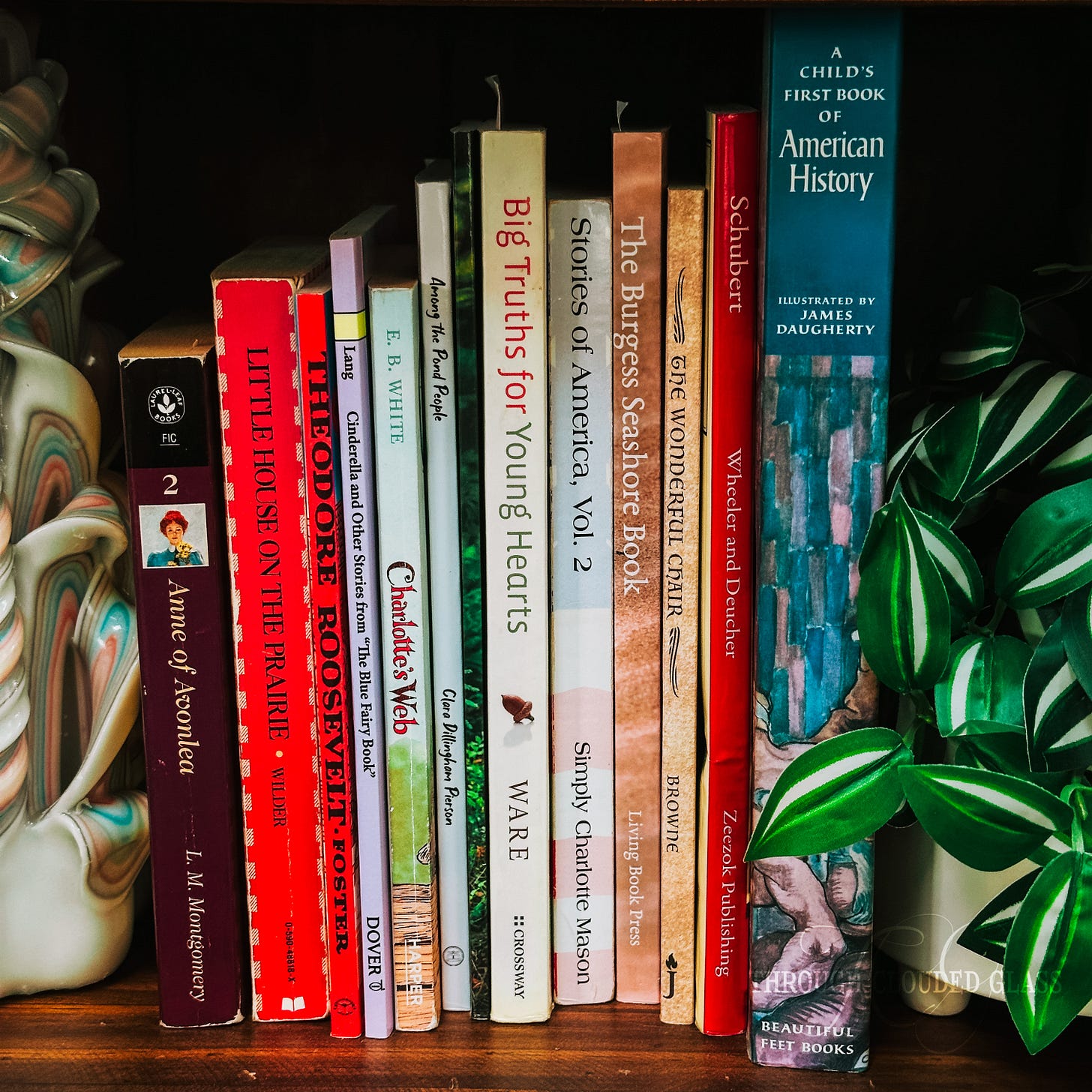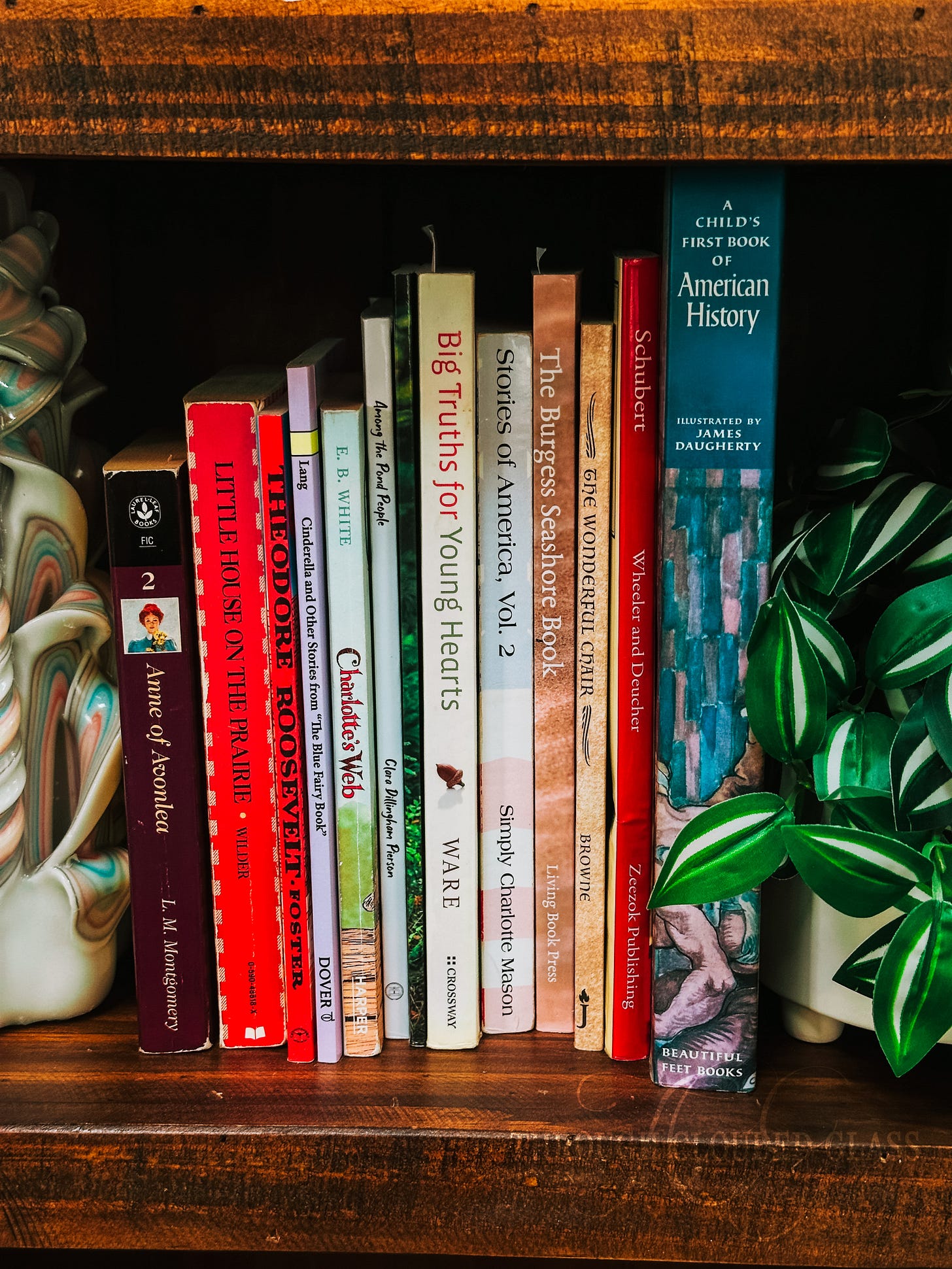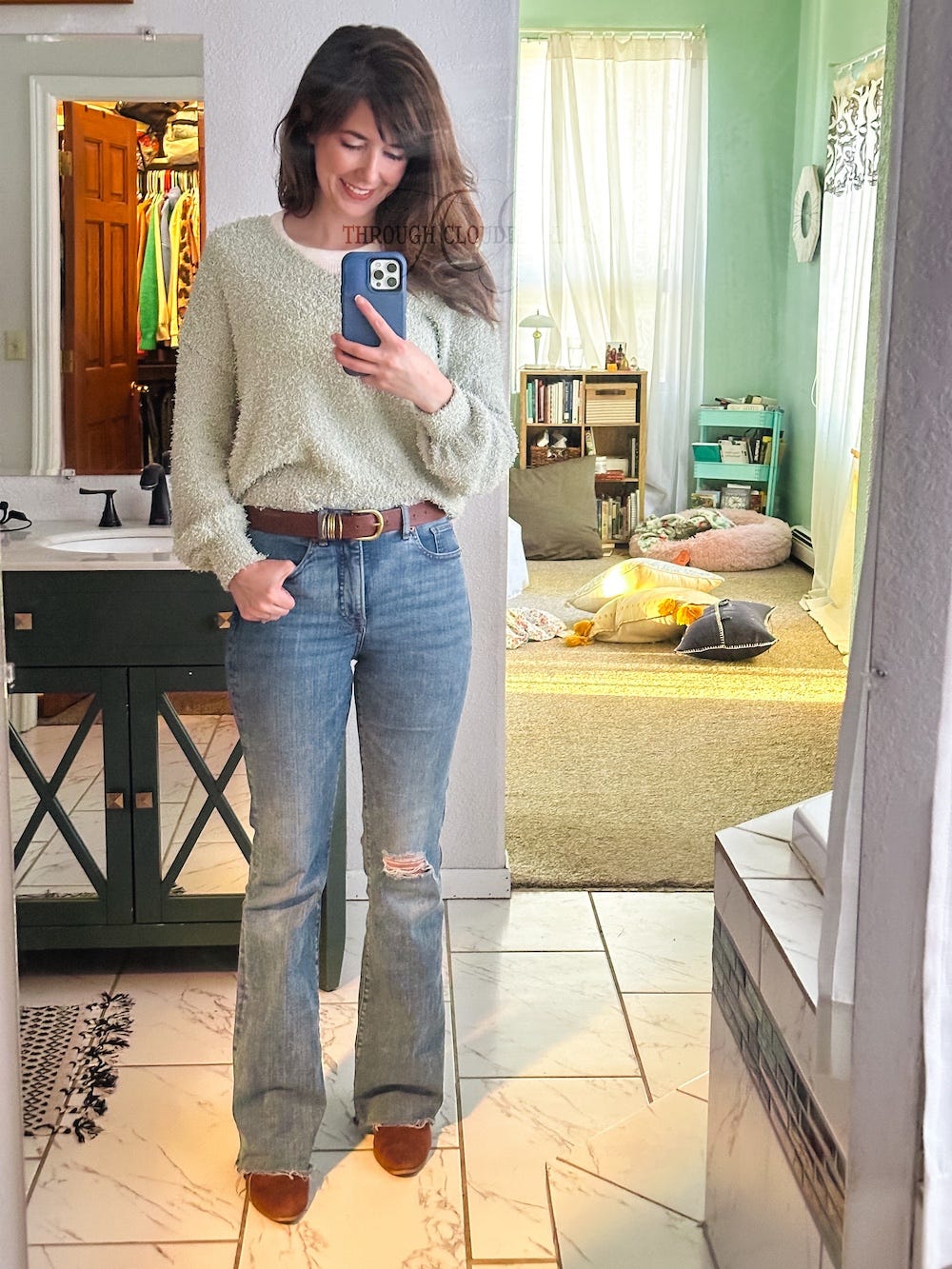I have been deep in the homeschool world for the vast majority of my life, to the point where I sometimes forget how not-normal homeschooling must seem to the average mom. My mom started homeschooling me when I entered the 4th grade, and my own kids have only ever known being homeschooled. I’ve been going to homeschool conferences ever since my oldest was in kindergarten, and I’ve read more books about homeschooling than I can remember off the top of my head.
But sometimes I try to put myself in the shoes of someone who has just started to become curious about homeschooling. Maybe they have seen beautiful portrayals of a homeschool lifestyle on social media and they find it appealing. Maybe they’ve recently listened to a podcast or video with ideas that intrigued them. Maybe they know a homeschool family and would just like to understand them better.
If a friend told me they were curious about homeschooling, these are the books that I would pull off the shelves and hand to them.

For someone who just wants to know how it all works:
Answers For Homeschooling: Top 25 Questions Critics Ask by Israel Wayne
Whether you are mystified about the whole idea of homeschooling, or you want to be able to explain your interest in homeschooling to friends and family, this book will be a help to you. Wayne covers questions from critics and also addresses many practical homeschooling concerns.
For someone who wants to homeschool but is worried about socialization:
The Well-Adjusted Child by Rachel Gathercole
Gathercole addresses every concern about socialization you could think of in this book. She defines what good socialization is, then discusses issue such as family relationships, citizenship, peer-to-peer friendships, conversations between kids and adults, bullying, and being “cool”. If you need reassurance that your child won’t be missing out by being homeschooled, this is the book you should read.
If something doesn’t feel quite right about public education, but you can’t quite put your finger on it:
Weapons Of Mass Instruction by John Taylor Gatto
This book has been around for. along time, and though it’s not explicitly about homeschooling, it does paint a picture of what we could do differently (and hopefully better) than the current school system. Gatto was an award-winning public school teacher who quit teaching after thirty years and started speaking about the problems he saw with education in America. He weaves in information about the history of the public school system, and his insights are fascinating. Also see Dumbing Us Down by Gatto (shorter, also very good).
If you want to broaden your ideas about what education really is (hint: it’s not about reading textbooks and taking tests):
For The Children’s Sake: Foundations Of Education For Home And School by Susan Schaeffer Macaulay
This book was my first introduction to the idea of “living books”. As someone who has always loved to read, I was inspired to think of education in terms of connections and ideas, instead of merely remembering things until it is time to take a test. Macaulay gives an accessible introduction to the educational philosophy developed by Charlotte Mason, but whether you choose that style of homeschooling or not, there are so many sound principles in this book that are worth considering.
If you want to work on developing a truly Christian view of education:
Education: Does God Have An Opinion? by Israel Wayne
I always put a disclaimer when recommending this book to someone that the title sounds more provocative than the book actually is (at least in my opinion). Wayne gives a thorough argument for Christian education, and the chapters in the second half of the book address how to approach every educational area from a Christian worldview. These last chapters are where the book really shines! I’ve had certain children read the math chapter when they repeatedly asked “why do we have to learn math anyway” - and I can report that attitudes improved significantly.
If you want reassurance and help for a rigorous academic outcome from homeschooling:
The Well-Trained Mind by Susan Bauer
First I want to say, don’t pick this one up if you are overwhelmed or are already dealing with learning struggles. This book is not for everyone - I myself picked it up when my oldest was in kindergarten and was immediately discouraged because I couldn’t picture doing everything this book suggests. I tried it again closer to middle school, and have found it alot more helpful. However, if you are an academic person yourself, and you want a guide for providing rigorous academics for your kids, this book is it.
If you think you are ready, and you just need a push to dive in:
The Call Of The Wild And Free by Ainsley Arment
The author of this book is alot more “wild and free” than me, but even though our styles are different, I was pleasantly surprised when I picked up this book. The joy of a homeschool lifestyle bubbles off these pages, and I found myself remembering everything I love about homeschooling while reading. Arment paints a vivid picture of just how beautiful homeschooling can be, and I think it’s great for inspiring hesitant moms to jump in.

I hope if you are curious about homeschooling, you’ll find something to encourage you in this booklist - this doesn’t even scratch the surface of the amount of homeschool books out there, but it’s a good place to start!
Subtitle: How to do it, and why you may not want to

(The quintessential stack of homeschool read-alouds. These are about half of the books we went through this year.)
How can I help my kids learn to work more independently?
I’ve heard that question so many times, in conference talks, online forums, from friends, and from my own lips. Developing independent learners is something homeschool moms, especially moms of multiple kids, think about a lot.
I remember many days, collapsing into bed exhausted after being pulled in multiple directions all day, and wondering how long I could keep doing this. Helping my kids learn to work more independently became a crucial concern, like it would be the life or death of our homeschool. Now, as my oldest prepares to enter high school, I’ve seen him grow leaps and bounds in working independently, and I’ve learned a few things about helping kids be more independent. I’m sharing practical suggestions and a little straight talk.
1. Don’t push for independence too early.
When my kids were still in elementary school, in a desperate bid to find something my kids could start to do without me, I gave my older kids a workbook for language arts. When I had to be busy with another child, I would ask them to pull these workbooks out for some independent work.
At first the year seemed to go along swimmingly, but eventually I realized that while my kids were progressing to the next lesson each week, they still could not tell me the parts of speech. When we had a minor existential crisis over writing a poem, I realized that what I thought was independent work was really just busy work. In order for my kids to really learn what the workbooks were trying to teach them, I would need to sit down and go over everything with them step-by-step.
On top of that, I had wasted valuable learning time during that homeschool year when a little more effort from me up front would have set a stronger foundation. My kids were not ready to be independent, and that was normal, and I had to learn to accept it.
I think a mistake that we often make is pushing our kids to be independent in their school work too early. Some kids are naturally more independent and make homeschooling look so simple, but we need to be careful of even putting those kids into the “independent” category too quickly. Our kids may appear to be making progress, but if we never sit down and watch them do their work, we can’t really know if they are learning something, or if they are just pushing ahead in the book even when they don’t quite understand a concept. It’s our job as the homeschool mom to help them actually learn, not just get through a workbook. In the younger grades, kids need a strong foundation of understanding, through a lot of help from mom, so hopefully they can be solidly and truly independent in the older grades.
2. Start with checklists.
Once your child is at an age where they can reliably manage their own work - this usually comes in stages, so probably just one or two subjects at first - consider helping them stay on track with daily checklists.
Before I developed our checklist system, I’d often be working with one child, and another would interrupt to ask what they should do next. “I don’t know, go start on your next subject,” ended up being my vague default response - and my poor child, who still didn’t know what to do, would end up deeply invested in a lego game with a younger sibling instead of accomplishing anything.
Eventually I realized that we needed to break out of that habit, and one summer I created a document with a weekly checklist for each child, with all their subjects broken up into days. It looked something like this:
Monday:
-Math lesson -Grammar book -Copywork -Writing video (with sibling) -Read history
Tuesday:
-Math lesson -Grammar book -Copywork -Write outline for paper -Read science lesson
Wednesday:
-Math lesson -Latin -Copywork -Write first draft -Read history -Work on Awana book
Thursday:
-Math lesson -Latin -Copywork -Finish paper -Read science
Friday:
-Math lesson -Art lesson -Copywork -Type up paper -Science experiment with mom
That’s a very simplified example, but you get the idea. I have checkboxes next to each task, and once the checklist are finished, my kids know they are done for the day. I think it is motivating for them to see how much is left and to know they are making progress. It helps prevent wasted time since they always know what else they can work on by themselves (I will sometimes highlight their independent subjects a different color from the ones they need my help with). I even print these checklists for my little girls, but I am the one who manages the checklists for them, since they still need my help for nearly everything. The checklists keep me on track too.
3. Map out the year.
You can’t expect to just hand a child a homeschool curriculum and have them proceed without any help or direction from you.
A couple years ago, as my son entered middle school, I started having an “orientation day” with him toward the end of summer. We sit down with his school books and a calendar, and I show him how many lessons are in each book, how many days we have in the school year, and how many lessons he would have to finish each week to stay on track. I sometimes even write up syllabi and expectations for each homeschool subject - which is helpful, but you don’t necessarily need to go that far.
What I am trying to accomplish with our orientation days is teaching my child how to look ahead at the whole year, and provide checkmarks for them to be able to easily see that they are staying on track. It’s really teaching them how to plan by holding their hand through the process. Some kids may catch on quickly, and for most kids you’ll have to repeat this process every year until they can naturally take it on themselves. I think middle school is the best time to start this - remember, not expecting too much too early, but hopefully helping them learn more planning skills before they reach high school.
4. Remember that independence does not mean mom can be hands-off.
Another mistake I see in homeschool circles (and that I have made myself) is the tendency to become a little slack on checking up on your child once they have reached a certain level of independence. This is how you reach Christmas break and take a peek inside your child’s Latin workbook only to realize they are two months behind (ask me how I know).
Even if your child is on the correct lesson number, remember that it’s still your job as a homeschool mom to make sure the understanding of the subject is there. You should frequently ask your more independent child about what their science book is covering right now, take a peek into their workbooks often, make sure you are grading their papers and tests so you can help shore up any areas where they are struggling. Be ready to answer questions, edit their papers together so they can learn how to improve their writing, and expect to have to research the answers to confusing math questions.
If you find yourself never doing any of these things, I’d encourage you to check yourself. Are you too busy with your own projects or outside commitments to make sure your kids are progressing as they should? Are you spending too much time on your phone, and not enough time enriching your child’s homeschool experience by actually talking with them about what they’re learning?

The truth of the matter is, there really is no point when a homeschool mom can just lean back and rest on her laurels, until her kids are graduated - maybe not even then. Homeschool students are always going to need help, direction, tips, discussions, and check-ins with mom. These things aren’t a chore, but an opportunity to pour into and connect with our kids through their education. Don’t wish those tasks away - don’t push your kids too much to not need you. They do need you, you are their best and only teacher, and being there for them is the beautiful thing about homeschooling.
I’d love to hear any more tips or encouragement you have on this subject! Comment below.
Our lilac bush, which has not bloomed in three years, came to life with flowers this year. As I was choosing a photo for this post, I remembered the too-many photos I took of the lovely blooms, and it struck me that our lilac bush feels like a fitting metaphor for our homeschool season. After two years of struggling through our homeschool days, somehow as we close out this year I find myself less burned out and more excited about homeschooling again.
Often when I write these “lessons learned” posts I’ll have some general principles and advice mixed in with my points, but I don’t have any this year. The changes we made were unrelated to any specific challenges we had, but ended up shifting our homeschool dynamic in unexpected ways.
Last year I ended the year struggling hard, and the fact that this year was better is probably a mix of the changes I made and also just entering a different season with my kids. I don’t think if you are struggling you should do the same things we did this year - but if you are struggling in your homeschool, make the changes YOU need to make to feel excited about homeschooling again. Don’t be afraid to try something new, because sometimes it ends up being just what you needed.
These are the two new things we did that breathed some life back into our days.
1. We started a new Charlotte Mason curriculum for history, geography, and literature.
We have been doing Masterbooks for history since the kids were small and to be clear, we have loved it! But after going through the same books several times now, I was ready to try something else. I heard about a reformed protestant Charlotte Mason curriculum that was in its beta year, called Living Heritage, and I was intrigued. I liked a lot of the books on the lists and the layout of the curriculum, and I decided we would give it a try.
I have been familiar with Charlotte Mason’s philosophy for years, and we have incorporated some of her principles (such as narration), but this was our first attempt at a full Charlotte Mason approach for certain subjects. We followed Living Heritage Cycle 4 for history, geography, art and music, and literature (with one or two science books as well).
Living Heritage ended up being a success for all my kids. I saw them grow leaps and bounds in their abilities to recall information from the readings, and in their writing endurance (for my older kids). We had zero complaints about any of the books (except my boys making fun of the opera stories we read), and my older kids asked to continue reading “real books” for history next year too.
Since we have never done another true Charlotte Mason curriculum, I can’t compare it to the big curricula, like Ambleside Online or others. It’s my understanding that there is some crossover in the booklists. What I appreciated the most about Living Heritage was the Bible, which is treated as a full and important subject. The books under “Bible” were so rich and theologically deep. I was especially nervous that the 8th grade Bible read would be too tough for my oldest, but I was pleasantly surprised at how much he understood and retained. It taught me that I shouldn’t underestimate my kids’ abilities to understand and enjoy even hard books.
This ended up being one of my favorite years of our homeschool, but not because it was easy. We combined Living Heritage with other curricula for science and math, as well as different “spine” books for our co-op classes. It was challenging to balance everything we were doing, but I think it stretched and grew my kids, and raised my own confidence in what we can accomplish if we manage our time well. We spent a lot of time on meaningful learning, and it wasn’t a burden to me or the kids because we really enjoyed so many of the books.
I did make adjustments as we went - I dropped one classic that was proving too much of a burden, and a couple books slipped off the list merely because of time. But when I look at the stacks of books we did read, I’m left with alot of satisfaction. We will adjust the curriculum to work with our high school plan for the fall (I still can’t believe my oldest is in high school), but it wasn’t even a question that we would be doing Living Heritage in some form again. You can check out Living Heritage here.
2. We rejoined a local co-op.
After taking a four-year break from any kind of co-op group, we re-joined a local co-op this past fall. We were part of this same group when my oldest was in 3rd and 4th grade, but at that season of life with young kids, I found it too challenging to attend a weekly co-op. I was floundering and recognized I need to spend some time developing my own homeschool discipline and direction before considering a co-op again. My goal was to wait until my youngest had learned to read - and after she finished her kindergarten year, we visited the co-op again.
The timing was right for us to give co-op a try for multiple reasons. My kids were more academically independent, we had good homeschool routines established, and my youngest was reading. Over the past several years we also had several of our core homeschool friends either move away or stop homeschooling all together, and we were in a place of needing a group we could connect with locally.
It’s been new for me to balance having a vision for our homeschool days at home and keeping up with our co-op work, but it helps alot that our co-op is mom-run and flexible. All the kids’ co-op leaders are also homeschool moms with their own things going on, and we recognize that mom makes the final call on what work needs to get done and when. My kids get the most out of it when we stay on schedule with co-op, but if we have a bad week or choose to drop an assignment in favor of something else, we have freedom to make adjustments.
Socially, it’s been a lovely thing for the kids, and I don’t take it for granted. They have made friends, they have just the right balance of structure and visiting time, and the kids in this particular co-op have seemed to mesh together very well. It was what we needed this past homeschool year to keep us encouraged.

Most homeschool moms would tell you that you often have to re-learn how to homeschool every year - there are always new challenges and adjustments that need to be made! This year we took a risk on changing our homeschooling style for over half our subjects with Living Heritage, and adding a big item to our weekly schedule with co-op, but both of those changes ended up paying off, by God’s grace. I’m thankful to end this homeschool year feeling satisfied instead of burned out.
How did your homeschool year go? Did you make any major changes, or was it a year of staying the course?

(I’m back to writing again after a hectic month! Here’s what’s been happening.)
On The Page {Anything I’ve Read}
{Cookbooks}. My sweet husband is also a wonderful cook and frequently takes over cooking dinner to give me a break, but I decided recently that I wanted to take dinner off his plate all together. So I’ve been reading various cookbooks and trying to figure out how to be more organized about dinner. Meal planning has never been my strong suit, and if anyone has advice or resources to help me, please chime in. I would like to improve my cooking skills, which could be better, and organizational skills when it comes to meal prep is my biggest challenge right now.
{Anna Karenina}. One of my big reading goals for the year is to finish Anna Karenina. I have been very consistent about reading it nightly, and it is an easier read than I thought it would be. I was never interested in reading it, but recently saw it on this list of “Novels To Help You Be A Better Mom” - after reading some of it, I can see how that could be true by providing a contrast, since I can already see Anna is headed down a bad path.
In My Armchair {Projects I'm Working On}
{Making homemade cleaners}. A few years ago I went on an essential oil kick, and I gathered quite a collection of oils. In fact, I gathered too many just because I was curious about different scents, and now I am left trying to make sure I actually use all those oils. I’ve occasionally tried different DIY cleaner recipes with my oils, but most clean recipes use vinegar, and I don’t enjoy my house smelling like that. I recently came across this recipe that uses orange peels, and I have some cleaning concentrate brewing in my pantry right now. That still doesn’t help my essential oil issues though, so I found this recipe that uses Castile soap, and I’m going to give it a try as well.
In The Kitchen {Things We Made}
{Old standbys}. We’ve been in survival mode after a stressful couple months around here, so the old standbys are keeping us afloat. We’ve enjoyed comfort foods like homemade macaroni and cheese, my usual bread baking, and soups.
{Some new favorites}. I while back I downloaded and printed some recipes that were supposed to be good for kids to do on their own. I pinned them to my fridge and forgot about it, but a few weeks ago my oldest daughter found one for granola bars, and asked if she could make it. She’s made it a couple times now, and her granola bars are so chewy and satisfying! I also have been working out of a high-protein recipe book (this one), which prompted me to try a real balsamic glaze for chicken recently - it was so good, I don’t know why I’ve never used glazes before.
On My Person {Things I've Worn}
{Stuck in winter}. This is the time of year where I start to get the itch to start putting together outfits with a more springtime vibe. Unfortunately, the weather is not cooperating with my vibes, so my outfits are still stuck in winter.


(Every coat and jacket in these pictures, except one, brought to you courtesy of my favorite thrift store.)
In The Accounts Book {Money We Have Saved}
{Grocery shopping pickup}. I might have mentioned this already, but one way I try to save money each month is by doing my grocery shopping online. I can really see what I’m spending when I add each item to my cart and see the prices adding up, and I can make adjustments to make sure my total is what I want it to be. I can also check my pantry to make sure I actually need something before I buy it, which I can’t do in the store. When I go browsing in the store I sometimes end up adding things to my cart that I did not come in for, and shopping from my couch helps cut down on those impulse purchases because I have time to think everything through.
Out My Window {Beauty I Noticed}
{Flowers sprouting, maybe?}. Even though it is not truly spring in the mountains until May, this is the time of year when I go about looking for any little clues that spring is coming. I poked around in my flower pots from last year and spotted some tiny little sprouts of greenery…it snowed the next day, so who know if it will come to anything, but one can hope!
Out And About {Places We Went}
{Snowmobiling with my parents}. In their almost-retirement, my parents have reignited a hobby from their youth - snowmobiling! They go most weekends in the winter, and every year they take our family on a Saturday snowmobiling trip. We’ve been doing this for several years now, but this is the first year I felt like it took no time at all for me to get comfortable driving. My oldest was also able to ride on his own since he’s 14 now (the family age requirement). We had a blast - it’s always lovely spending time with family, and this is a special tradition that we are grateful for.
{Several Valentine’s Day parties}. Some years have been pretty slow around Valentine’s Day, but this year we had three different Valentine’s events to go to - two with homeschool groups, and a family party put on by my mom. The kids loved all of it! We love Valentine’s Day around our house, as an opportunity to show family and friends that we appreciate them.

On My Mind {Thoughts I Want To Share}
{Some homeschool thoughts}. After an interesting conversation recently, I have been reflecting on how we as homeschool moms tend to have an especially difficult struggle whether our kids are succeeding or struggling in any given academic area. Because we have taken on our kids’ education ourselves, we think “it’s all up to me” - if our kids are doing particularly well, the temptation is to attribute their success to our superior philosophy or efforts, and if they are struggling we bite our fingernails and think we must be doing something wrong. There’s pride on one side and some level of despair on the other. But in the end, it’s really all pride on both sides of the ditch.
The best thing is to walk in the middle, with a humble heart, recognizing that our kids’ strengths and weaknesses are a unique mix given to each of them by God…and our job is not to pat ourselves on the back or wring our hands over either strengths or weaknesses. We shouldn’t compare to what other kids/families are doing, or some vague idea of what “level” they are exceeding or failing to meet, but to recognize growth - comparing our kids only to themselves and how they’ve grown, and asking God for wisdom on how we can help them grow further. This has been a hard-fought lesson for me since my kids were little, and something I’m learning again as I think ahead to high school next year!
In My Heart {Things I'm Treasuring}
{1} Family and friends that I know will pray for me when I ask.
{2} Fresh blueberries, waiting in the fridge for me to make jam.
{3} Chocolate coconut macaroons.
{4} Going outside and hearing the birds greeting the morning once again.
{5} Kids that are so understanding and flexible when plans change.
{6} The urge to start researching curriculum for next year - I know they say not to indulge it before finishing the current homeschool year, but planning is so fun!
{7} Impromptu coffee dates with my husband.
{8} A thrift store that always has treasures hiding on the racks if I look hard enough.
{9} Snow and sunshine on rotation.
{10} Mud on our boots, the first sign of spring.

Last week my family and I attended our state homeschool conference. Every year I learn something new, find great curriculum deals, discover curriculum that is new to me, and leave encouraged.
I’ve written before about why you should attend a homeschool conference if you get a chance. I think I may do another version of that article someday about why you should attend a Christian homeschool conference, even if you don’thomeschool. If a homeschool conference is a good one, at least half of the sessions would be uplifting to any Christian family, and I love that about our local conference. The focus is on raising our children and discipling them, and then also practical/academic tips - but the meat of it is a biblical philosophy on child-rearing that would benefit any Christian parent.
I received a conference-recap email from one of the many homeschool blogs I follow, and I really enjoyed it and was inspired to share a few takeaways from the conference we attended (including some interesting curriculum finds).
My Main Takeaway
A big theme of our conference this year was passing on the faith to our children. If you are not aware, the statistics on youth leaving the church in Protestant denominations in the United States are very grim. A full 70% of Christian youth leave the church, and these statistics haven’t improved in years - if anything, the situation has worsened. There were a couple different lectures about this topic (from Israel Wayne and George Barna), and though I only attended Wayne’s talk, from what I can tell the bottom line was the same - taking your children to church every week isn’t enough. Sending them to a Christian private school isn’t enough. Even homeschooling isn’t enough!
Kids need to have a good relationship with their parents, and they need to be trained by their parents. No one has as big of an impact on the faith of children as their parents do. Children need to know the tenants of their faith, see it being put into practice by their parents, and receive focused teaching about biblical doctrines (the truths of the faith) and a biblical worldview (how those truths should affect the way they see they world and the way they live).
You obviously can’t pass on that kind of knowledge and faith if you don’t have it yourself! Alot of Christians think we have a biblical worldview, and we don't realize that in many cases, we actually don’t. Wayne shared the PEERS test, which is a biblical worldview test - he said that though he quibbled with the phrasing of a few of the questions, it’s not a difficult test. The statistics among different groups of students who have taken this test are very interesting (and scary, honestly).
(This is a graph from the Nehemiah Institute website, the organization that produced the PEERS test. That blue line represents a TINY number of Christian private schools that have a high focus on biblical worldview training, as opposed to those that focus on academics - only about 2% of Christian kids are in those types of schools. The green line represents homeschoolers, who only started being included later. Honestly, I think we homeschoolers could do better. The traditional Christian private schools and public school lines should be sobering. Keep in mind that all of these lines represent ONLY youth from Christian households.)
The benefit of homeschooling as it relates to all this can be summed up in one word - time. Parents have the biggest influence on their kids, but that influence can be diluted by a lack of time spent with our kids. Homeschool parents have an advantage because we are not lacking for time - we are with our children nearly all day, every day!
Homeschool children (should) have an up-close look at what a Christian life should look like, because they see it playing out in every situation we encounter daily. Scripture tells us that “everyone who is fully trained will be like his teacher” (Luke 6:40). That’s a little sobering, isn’t it? It means as homeschool parents we need to be careful that we ourselves are living out a truly biblical worldview. Our strengths in this area will likely be passed on to our kids, but also our weaknesses.
Time is also a crucial ingredient for building any strong relationship, including with our children, and having strong relationships with both parents provides a distinct statistical advantage in passing on the faith to our children.
(This chart is from the Gen2 survey, which is a general survey of churched Millennials and the impact of their upbringing on their practicing of the Christian faith as an adult. You can look at all the findings from that survey here. They are up-front about the fact that more people who were previously homeschooled took the survey than those schooled in other ways, despite trying to specifically advertise to those who went to public or private school. Despite the sample being a little uneven, it’s still pretty interesting.)
Homeschoolers, we have alot of things working for us! The trick is not to squander all these advantages, which can certainly happen. This whole discussion was simultaneously heartening and challenging to me.
For Further Reading
Though the website is a little old-school, I recommend exploring the Nehemiah Institute - they are the organization that produced the PEERS worldview test, and they have alot of interesting documents and resources.
For more information specifically on the exit of youth from the church and what we might do about it, I highly recommend the books Already Compromised and Already Gone by Ken Ham.
Israel Wayne has a couple helpful books about parenting and education that I’d recommend: Raising Them Up and Education: Does God Have An Opinions? (don’t be put off by the title, it’s a great book - I even had my oldest read the chapter on math, and it greatly improved his attitude!). He also has a systematic theology and biblical worldview curriculum for middle and high school that we picked up for our 8th grader this year.
George Barna also has a new book related to this topic, and I haven’t read it yet, but I might pick it up: Raising Spiritual Champions.
Other Interesting Sessions
“Why Americans Can’t Read” - Alex Newman - It’s shocking how illiterate we have become in America - half of American adults are functionally illiterate, and those statistics are coming from the Department of Education itself. I couldn’t find an article from Newman related to this topic that wasn’t behind a paywall, but the answer to this problem comes down to one thing - we need to ditch the “whole word” method and go back to actually teaching phonics.
“The Problem With School Choice” - Alex Newman - There are alot of unintended consequences with allowing the government to fund ALL school choices via vouchers and other forms of funding, which is a big push in many states right now. You can read this document if you are interested, which includes alot of the information Newman shared in this talk.
“Help! The Highschool Years Are Coming!” - Jan and Roger Smith - This session included so much encouragement for the high school years! I couldn’t find any articles about this specific topic online, but you can hear from the speakers on Zan Tyler’s podcast.
“Is Homeschooling Just For Women? - Israel Wayne - My husband went to this session and came back inspired and challenged in his role as a Christian (and homeschool) dad! I’d personally recommend anything by Israel Wayne, I’ve been encouraged by his resources many times. You can check out his ministry here.
Interesting Curriculum
Homeschool In A Box - I didn’t get to explore this booth much, but this company is on my list to research - their booth had a bunch of themed, hands-on learning boxes that I think my kids would find so fun!
Homestead Science - This is a family-run homeschool company from Idaho, and I am particularly interested in their survival study, which seems right up our alley.
Math Without Borders - We spent a good amount of time talking with the man who owns this company about this high school math option - it’s on my list to research for next year! But I wanted to point out “The Grandpa Project” on his website, which includes a bunch of videos he put together for his elementary and middle-school grandchildren to learn more about math - and this page in particular is the best math facts flashcard system I’ve ever seen online. All this is free on the website, and we’ll definitely be using it this summer! He also has a “bonus topics” page with a bunch of fun math videos that we’re going to explore.
New Generations Resources - Generations is a curriculum company we’ve been exploring for history mainly, but my little girls have also been enjoying their science books - they have this new science curriculum coming out for 3rd grade about the human body that I’m considering getting! They also released this adorable catechism book for the littlest learners - I really love that all the answers to these catechism questions are an actual Bible verse.
There are so many other interesting tidbits I could share, but I’ll leave it there! I would love to hear if you’re ever been to a homeschool conference, how it was helpful for you, or your thoughts about any of the topics or resources I shared here! Comment below, or hit reply if you are receiving this in your inbox.

Our homeschool year ended so differently than it began, it's a little difficult to begin this post.
Last fall, I knew this would be one of our hardest homeschool years yet, and so I went into it in tackle mode. We struggled, we cried, we ended each day exhausted, but by the end of the first semester, we were enough ahead that we were able to take it easier in the spring. Because of that, I feel pretty optimistic as we closed the books in May, and it's hard to remember back to where we started. But taking some time to reflect and learn from our successes and failures is a good thing, so I'm looking through my old papers as I think the year through.
I already shared things that ended up working well for us this past year, and so this post will be focused more on lessons learned, and things that didn't end up working for us.
First off, to get you into my frame of mind last fall, I spent the entire summer last year worrying about some areas of weakness in our homeschool. There were several skills I wanted to be stronger, several additional subjects I wanted to cram into our school year, not to mention the fact that my oldest was solidly in Junior High, and I wanted to start helping him develop specific study skills. Oh yes, and my youngest would be starting kindergarten.
It was alot to tackle all at once, and I approached the coming school year with a sense of dread, if I'm going to be honest. But I "tightened my belt", as Bilbo Baggins would do, and jumped into the school year with fervor.
Lesson #1 - It is (mostly) a mistake to overload the curriculum.
In my planning frenzy last year, I decided we would try to make it through five (five!) history curriculum books for my older kids, each of which were each meant to last an entire year. I justified this because a couple of the books were a little lower-level, and I figured we would just read through them on the side instead of doing the assignments. I'm still not sure why I decided to do this - remember, I was extremely anxious last summer, and not quite in my right mind.
What ended up actually happening is that we got through three of the planned-for books, which in retrospect feels like quite an accomplishment, even though we fell short of the five (five!) I had planned. What we did get through was actually quite lovely, and my oldest has surprised me by quoting something from our Greek and Roman studies (example:"'Tis the crumpled rose leaf!"). So I say it is only mostly a mistake to overload the curriculum, because if I hadn't overloaded, we certainly wouldn't have learned so much this year. But it is a mistake in that it can make everyone's lives a little miserable if you tip over into "too much". More may be doable than you might think, but certainly not five different history curricula (five!).
- America's Story 1 - 2nd, 4th
- America's Story 3 - 5th
- World's Story 1 - 7th
- The Story Of The Romans by Miller
- The Story Of The Greeks by Miller












